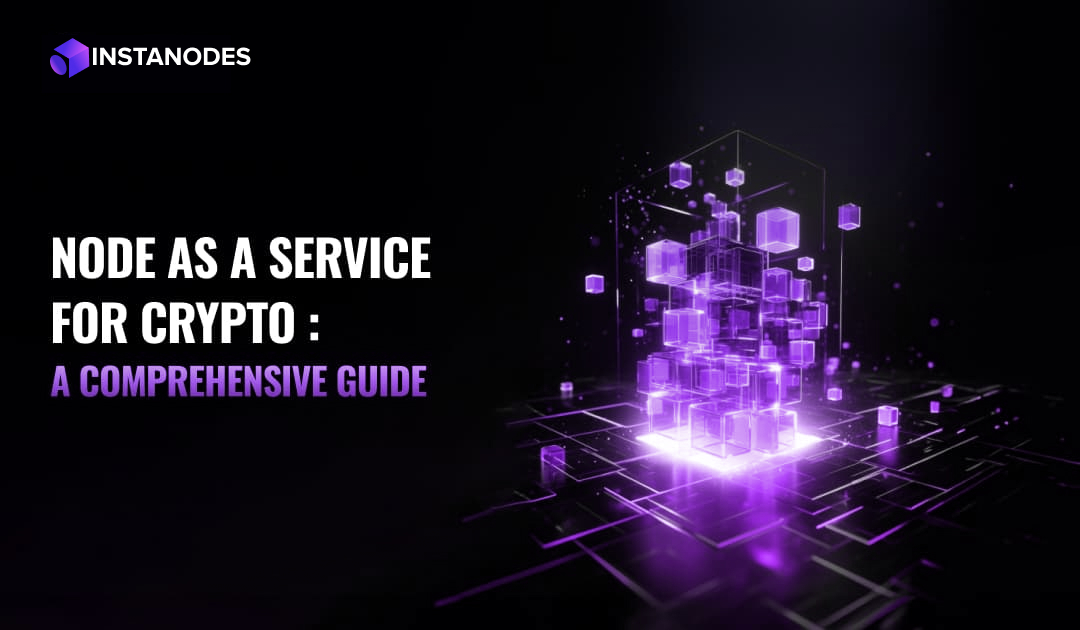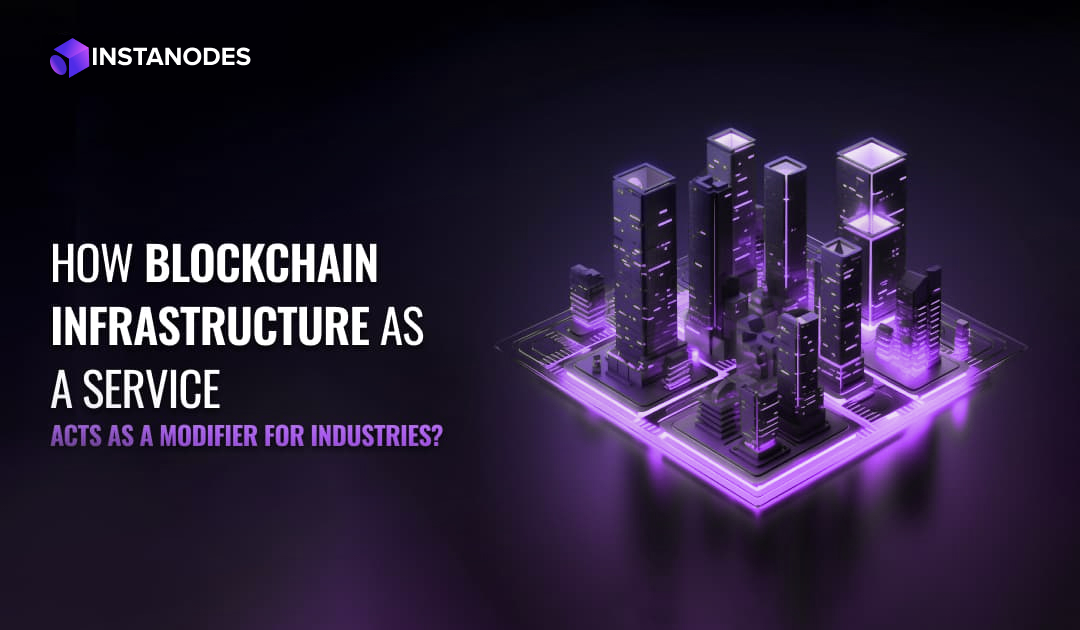
by Admininsta | Nov 14, 2023 | blogs |
Blockchain nodes are essential for the operation of any blockchain network. They are responsible for storing and validating transactions, as well as maintaining a consensus on the state of the blockchain. Running a node can be a complex and time-consuming task, especially for those who are not familiar with blockchain technology.
Node as a Service crypto (NaaS) providers offer a variety of services that make it easy to run a node without having to worry about the technical details. This includes providing pre-configured nodes, managing node infrastructure, and providing support.
Web3 node provider plays a crucial role in setting up blockchain infrastructure for businesses. It allows them to focus on their core competencies, such as developing new products and services, without having to worry about the hassles of running a node.
Benefits of NaaS for Crypto
There are several benefits to using NaaS for crypto, including:
- Convenience: NaaS providers take care of all the technical aspects of running a node, such as setting up the hardware and software, and managing node infrastructure. This frees up businesses and developers to focus on their core competencies.
- Scalability: Node as a Service crypto providers typically offer a range of node options, including dedicated nodes and shared nodes. This allows businesses to scale their node infrastructure as needed.
- Security: They implement a variety of security measures to protect their nodes from attack. This includes using firewalls, intrusion detection systems, and other security technologies.
- Reliability: A reputed Web3 node provider offers high uptime guarantees for their nodes. This means that businesses and developers can be confident that their nodes will be up and running when they need them.
Use Cases for NaaS in Crypto
NaaS can be used for a variety of purposes in crypto, including:
- Running decentralized applications (dApps): Many dApps require users to run a node to interact with the application. NaaS makes it easy for users to get started with dApps without having to worry about the technical details of running a node.
- Developing and testing crypto applications: NaaS can be used by developers to develop and test crypto applications without having to set up and manage their nodes.
- Running crypto businesses: NaaS can be used by crypto businesses to run their infrastructure, such as crypto exchanges and wallets.
- Participating in blockchain governance: It can be individuals and businesses to participate in blockchain governance, such as voting on proposals and validating transactions.
Choosing a Web3 Node Provider
When choosing a web3 node provider, there are several factors to consider, including:
- Supported blockchains: Make sure the Node as a Service crypto provider supports the blockchains that you need to run a node for.
- Node options: Consider the different node options that these providers offer, such as dedicated nodes and shared nodes.
- Security: The NaaS provider implements a variety of security measures to protect their nodes from attack.
- Pricing: Compare the pricing of different NaaS providers to find the best deal for your needs.
- Reliability: And at last it also makes sure the NaaS provider offers high uptime guarantees for their nodes.
NaaS can be a valuable tool for crypto businesses and developers. It allows them to focus on their core competencies without having to worry about the hassles of running a node.
When choosing a NaaS provider, be sure to consider the factors listed above, such as supported blockchains, node options, security, reliability, and pricing.
Example Use Case: Running a Crypto Exchange
A crypto exchange is a business that allows users to buy, sell, and trade cryptocurrencies. Crypto exchanges need to run nodes on the blockchains that they support to verify transactions and maintain a consensus on the state of the blockchain.
Running a node can be a complex and time-consuming task, especially for crypto exchanges that support multiple blockchains. Web3 Node providers can make it much easier and more efficient for crypto exchanges to run nodes.
By using a NaaS provider, crypto exchanges can focus on their core competencies, such as developing new features and attracting new users, without having to worry about the technical details of running a node.
Conclusion
Node as a Service crypto provider simplifies and streamlines the process of running a node. It is a valuable option for crypto businesses and developers of all sizes. If you’re looking for a Web3 node provider, consider consulting Instanodes and contact them for more information.

by Admininsta | Nov 14, 2023 | blogs |
Traditional Sectors often wrestle with the need for scalable infrastructure to accommodate growth. Blockchain Infrastructure as a Service (BIaaS) acts as a transformative force across industries and redefines operational paradigms. Choosing the best blockchain node provider helps ensure unparalleled security & efficiency, and modifies traditional business models. It also enhances transparency, streamlines processes, and fosters innovation. As a result, it propels industries into a new era of decentralized and trust-based ecosystems.
How BlaaS Breaks Down the Benefits For Traditional Industries?
The node providers offer several benefits by building blockchain infrastructure for traditional industries, such as Manufacturing, Education, Healthcare, Finance and Banking, and others. Here are some key advantages:
- Cost: Traditional industries often face significant upfront investments in hardware, infrastructure, and maintenance when establishing and managing their nodes. Blockchain Infrastructure as a Service (BIaaS) eliminates these costs by providing a subscription-based service. Companies can pay for the services they need and save their money in the long run.
- Time Management: The intricate processes of deploying, configuring, and maintaining nodes require both time and technical expertise. BIaaS providers adeptly manage these complexities and allow traditional industries to focus on their core business functions and expedite the development of applications.
- Seamless infrastructure: The best blockchain node provider ensures high availability and redundant infrastructure by minimizing downtime risks. This reliability guarantees that applications and services built on the blockchain remain stable and accessible around the clock.
- Security: The node providers prioritize this aspect through robust measures such as advanced encryption, firewalls, and access controls. This heightened security framework ensures the protection of sensitive data within the blockchain infrastructure.
- Analytics, Reporting, and Privacy: The Blockchain Infrastructure as a Service Provider offers valuable insights into node performance through panoramic analytics and reporting capabilities. Traditional sectors can monitor key metrics and track network activity, empowering informed decision-making. Additionally, privacy monitoring features ensure the protection of sensitive data throughout the blockchain ecosystem.
The adoption of BIaaS should be carefully considered based on the unique needs and challenges of each traditional industry.
Use Cases Of Deploying Blockchain Infrastructure as a Service in Traditional Sectors
- Manufacturing: Blockchain Infrastructure as a Service can optimize supply chain management by ensuring transparent and secure transactions. Smart contracts powered by blockchain nodes can automate processes, reduce fraud, and enhance traceability. Moreover, the immutable nature of blockchain ensures that the origin and journey of raw materials through the production line are recorded and provides manufacturers with a comprehensive view of their supply chain.
- Finance and Banking: The best blockchain node provider can benefit this sector by enhancing security measures and streamlining transaction processes. BIaaS solutions offer a secure and reliable backbone for financial institutions to build and deploy decentralized applications (DApps) for a seamless user experience. Blockchain node providers have the potential to revolutionize cross-border transactions and offer a solution to the common challenges of high costs that often afflict such transactions.
- Healthcare: Blockchain nodes can revolutionize healthcare by providing a secure and interoperable platform for managing patient records. Patient data stored on the blockchain is tamper-proof, ensuring data integrity and authenticity. This is particularly crucial in scenarios where patient information must be securely shared among healthcare providers. Blockchain Infrastructure as a Service solution can facilitate the creation of a unified patient record that is accessible, yet secure.
- Agriculture: The deployment of BIaaS in the agriculture sector heralds a transformative era of transparency and efficiency in the supply chain. By leveraging smart contracts, decentralized ledgers, and IoT integration, this innovative solution ensures traceability from farm to table. Farmers are empowered with fair compensation through automated agreements, diminishing the influence of intermediaries.
- Education: In the education sector, the integration of Blockchain Infrastructure as a Service has ushered in a new era of efficiency and transparency in education. Smart contracts play a pivotal role in automating administrative processes, from student enrollment to the validation of academic credentials. BIaaS facilitates secure and transparent transactions for financial aid, scholarships, and tuition payments and ensures that resources reach the intended recipients promptly.
How Much Does Blockchain Infrastructure as a Service (BIaaS) Cost?
If you are planning to invest in hiring a renowned Blockchain Infrastructure as a Service company, then you must evaluate its development cost for better decision-making. However, the cost of deploying BIaaS can vary based on multiple factors, including –
- Type of Blockchain- Different blockchain platforms have varying costs associated with their usage. Examples include Ethereum, Hyperledger Fabric, Binance Smart Chain, etc. The popularity and features of the chosen platform can impact costs.
- Compatibility- The type and specifications of the blockchain nodes you choose can affect the cost. EVM-compatible and non-EVM-compatible nodes may have different pricing, as they require different configurations and resources.
- Storage- Blockchain networks require storage for the ledger data. The amount of data generated and stored on the blockchain will contribute to the overall cost. Some cloud providers charge based on the amount of data stored.
- Consensus Mechanism- The chosen consensus mechanism (e.g., Proof of Work, Proof of Stake) can affect costs. Proof of Work mechanisms, for instance, may require more computational power and energy consumption.
- Scalability- If your blockchain project demands scalability and the ability to handle increased traffic and transaction volume, may increase the cost. Providers often charge based on the scalability options they offer.
- Subscription Model- Blockchain Infrastructure as a Service is often offered on a subscription basis. The subscription model can include monthly or yearly payments. Choosing a longer-term subscription might offer cost savings compared to month-to-month plans.
Use these considerations as a framework for insightful inquiries while engaging with potential companies.
Partner With Us
The harmonious integration of long-standing practices with the cutting-edge innovations that Blockchain Infrastructure as a Service brings to the table holds the key to unlocking a myriad of new possibilities. This synthesis cultivates heightened efficiency and scalability within traditional industries as well as fortifies the security infrastructure and creates a robust foundation for future growth and sustainability.
Instanodes, the best blockchain node provider, is the preferred choice for traditional companies seeking Blockchain Infrastructure as a Service solution. Our emphasis on reliable customer support, a 99.9% uptime commitment, robust security measures, and a cost-effective subscription model make it an attractive option.


